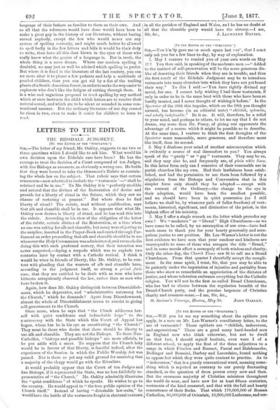LETTERS TO THE EDITOR.
THE RIDSDALE JUDGMENT.
[TO THE EDITOR OF THE "SPECTATOR.")
SIR,—The letter of my friend, Mr. Oakley, suggests to me two or three questions which I should like to ask him. What would his own decision upon the Ridsdale case have been? He has the courage to treat the decision of a Court composed of ten Judges, with five Bishops as assessors, as obviously a wrong one. He holds that they were bound to take the Ornament's Rubric as contain- ing the whole law on the subject. That rubric says that certain ornaments—now admitted to include the " vestments "—" shall be retained and be in use." To Mr. Oakley it is " perfectly credible and natural that the divines of the Restoration did devise and provide for a liberty of ritual in the future, which they saw no chance of restoring at present." But where does be find liberty of ritual? The rubric, read without qualification, says that alb and chasuble shall be in use. It appears that what Mr. Oakley now desires is liberty of ritual, and he has read this into the rubric. According to his view of the obligation of the letter of the rubric, certain divines of the Restoration, at a time when no one was asking for alb and chasuble, but many were objecting to the surplice, inserted in the Prayer-Book and carried through Par- liament an order prescribing that alb and chasuble should be in use whenever the Holy Communion was administered, and succeeded in doing this with such profound secrecy, that their intention was never suspected,—laying a torpedo which was to explode two centuries later by contact with a Catholic revival. I think it would be wiser in friends of liberty, like Mr. Oakley, to be con- tent with pleading that the wearers of alb and chasuble have, according to the judgment itself, so strong a prima fade case, that they are entitled to be dealt with as men who have hitherto scrupulously observed the law, rather than as men who have broken it.
Again, how does Mr. Oakley distinguish between Disestablish- ment, which be deprecates, and "administrative autonomy for the Church," which he demands ? Apart from Disendowment, almost the whole of Disestablishment seems to consist in giving self-government to the Church.
Once more, when he says that "the Chuch addresses her- self with quiet confidence and indomitable hope" to the controversy with the State which this Court of Appeal has begun, whom has he in his eye as constituting " the Church?" They must be those who desire that there should be liberty to use alb and chasuble. They are not the Bishops. To these Neo- Catholics, "bishops and possible bishops" are mere officials, to be put aside with a sneer. To suppose that the Church laity would be in favour of that liberty, is fanciful indeed, after the experience of the Session in which the Public Worship Act was passed. Nor is there as yet any valid ground for assuming that a majority of the clergy would go with the Ritualists.
It would probably appear that the Court of ten Judges and five Bishops, if it represented the State, was no less faithfully re- presentative of " the Church." Mr. Oakley admirably illustrates the "quiet confidence" of which he speaks. He wishes to go to the country. He would appeal to " the true public opinion of the Church itself." Instead of having " detestable law-suits," he would have the battle of the vestments fought in electoral contests
in all the parishes of England and Wales, an 1 he has no doubt at all that the chasuble party would have the victory.—I am,


































 Previous page
Previous page